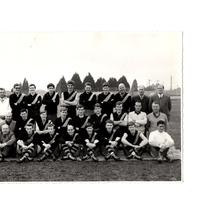Background: How I became a writer of peace songs
I was born on November 9, 1945 and grew up in the eastern suburbs of Melbourne. We lived in Camberwell until I turned eleven and then moved further out to Burwood. I attended Camberwell Central School through to Year 8 and then Ashwood High. Mine was a conservative, lower-middle-class upbringing. Political issues were rarely discussed at home but I always suspected my parents were closet Liberals. I was never very religious but did the expected thing and regularly attended Sunday school (Camberwell Church of Christ; Burwood Methodist).
From an early age sport was my most abiding passion. If I wasn’t outside playing cricket or football I was inside poring over my scrapbooks and memorabilia. I was good at sport and played senior cricket and football locally. In teenage years I was shy with girls. In 1963 I was dumped by a girl and was so depressed I failed my matriculation. In 1964 I started work as a purchasing clerk at Kraft Foods in Port Melbourne. It was a dead-end job and I hated it.
While still at school I sought solace and meaning in folk music. What I learned through folk music changed my life. I became aware of the history of social struggles for the first time – in particular the inspirational African-American struggle for civil rights. I befriended a ‘folkie’ from Elwood called Laurie Cohen who, chipping away at the puritanical edifice of my middle-class morality, introduced me to a heady brew of Oz magazine satire, Voltaire, rationalism, and Sartre’s (and De Beauvoir’s) existentialism. Before long there was little of my former world-view left and I broke with the church, theologically and socially.
To keep myself sane at Kraft I began writing songs – privately and in the 'boss's time'. Over the next two years I wrote hundreds, covering every conceivable topical subject. Looking at these lyrical efforts now I find them valuable original documents allowing me to plot my emotional responses to the great crisis of my generation – conscription.
Many of the songs I wrote in 1964 were an expression of deeply felt anti-war sentiment. Initially these 'peace' songs tended to be general statements of Christian pacifist principles. Here I provide verses extracted from four of these songs:
Shall we see the day when tank wheels are turning
Through the dust of the houses burning
Past the women on their knees crying tears of mourning
Shall we see, shall we see, shall we see?1
When Army men who make the wars
With self-defence their stated cause
Can stop to think of why – and pause
Then we'll have peace good to live in2
The Melbourne, The Voyager, The Thresher, Big 'E'
They all sailed for war – but it's all needlessly
For the money that's gone to put them on the sea
Could buy food for a million and a dinner for me3
You Christians who say hypocrites will finish up in Hell
Remember that by joining up you're being one yourself
The One you love and follow well – Jesus Christ your Lord
Has said that those who take up arms shall perish with the sword4
